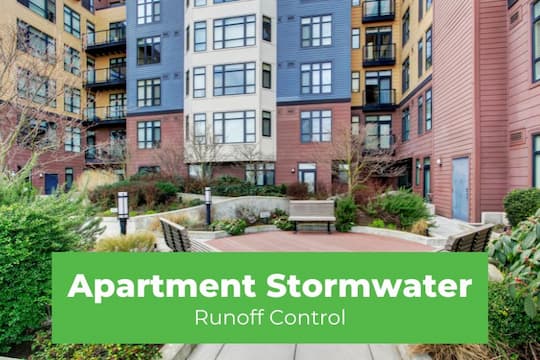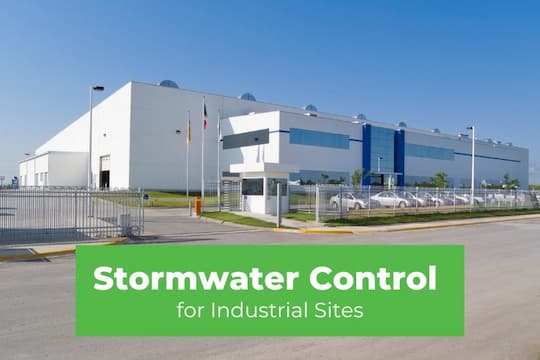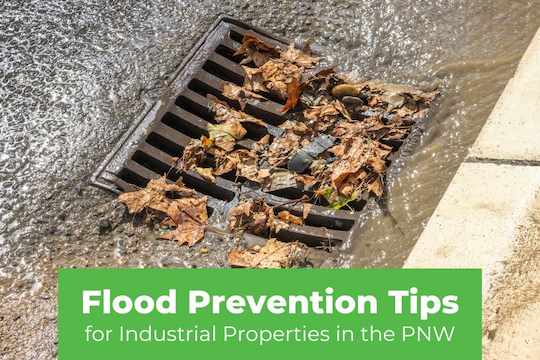Flooding on commercial properties is often caused by stormwater system backups. When drains clog or underground infrastructure fails during a heavy rain, the resulting water damage can cost thousands in repairs and downtime. Property owners and managers should conduct a regular flood risk assessment that prioritizes stormwater flow and infrastructure performance. Here's how to do it right.

Understand the Role of Stormwater Systems
Many commercial property owners are surprised to learn that flooding can occur even in areas not designated as flood zones. While FEMA maps and climate projections matter, most commercial flood events are caused by immediate, localized issues, especially blocked stormwater systems.
Start by identifying and documenting the stormwater assets on your property. These may include:
- Catch basins
- Detention systems
- Filter vaults
- Ponds
- Bioswales
These systems are designed to collect, hold, or treat stormwater runoff, but only if well-maintained. Debris, sediment, or structural damage can cause water to back up, overflow, or redirect in unexpected and destructive ways.
Perform a Visual Inspection and Identify Red Flags
Walk the property after a rainstorm to spot any visible pooling, erosion, or overflow. Look for:
- Sediment buildup or trash around catch basin grates
- Soggy areas or standing water that lingers after rainfall
- Downspouts that discharge directly onto pavement without routing to a drain
- Water stains on exterior walls or signs of past water intrusion inside the building
Flooding is often the symptom, not the cause. Even minor issues like slow-draining basins can be early signs of major backups. Document any issues you see, and cross-reference them with past maintenance reports or inspection notes. Suppose this is your first time auditing the system. In that case, it may be worth bringing in a professional for a more thorough assessment.
Review Flood Disclosure, Insurance Claims, and Local Records
Washington State requires disclosing past flood damage when selling or insuring a commercial property. Review this documentation carefully to determine whether past flooding stemmed from blocked drains, sump failure, or overwhelmed stormwater systems.
In addition, check public sources like:
- Your local municipality or county planning department (for known problem areas)
- NOAA storm event databases (to understand weather intensity)
- The USGS (for runoff modeling and topographic data)
You may discover a pattern of flooding in your area tied not to river overflow, but to aging infrastructure or changes in upstream development.
Evaluate the Property's Grading, Flow Paths, and Vulnerable Areas
Water always follows the path of least resistance. That's why your property's grading and drainage flow paths are critical.
Use the following checklist to evaluate:
- Is the landscape sloped properly away from buildings?
- Do driveways or parking lots funnel water toward or away from entrances?
- Are sump pumps in working order, and are there backups in place?
- Do low-lying areas on your property have proper drainage or overflow channels?
A well-designed stormwater system will fail if surface flow directs excess runoff toward doors, vents, or mechanical systems.
Think Beyond the Present: Plan for Growth and Rainfall Extremes
While most of your assessment should focus on current conditions, planning matters too. Urban development, changing rainfall intensity, and aging infrastructure increase the risk of future flood events.
Forward-thinking mitigation strategies include:
- Replacing solid asphalt with permeable pavement
- Expanding stormwater vault capacity
- Regarding areas that channel water toward structures
- Adding more catch basins or trench drains
- Enhancing sump pump systems with alarms and generators
These measures are essential in regions seeing more frequent, high-intensity rainfall events.

When to Bring in the Experts
If you identify signs of flooding or poor drainage, or want peace of mind, it's time to bring in professionals who understand how stormwater infrastructure should work.
Stormwater System Inspectors
Inspectors can use video inspection tools and specialized equipment to assess underground systems for blockages, root intrusion, broken pipes, or excessive sediment. A clean catch basin or vault is critical during storm season, and a neglected one is a significant liability.
Insurance Assessors
Even if flood insurance isn't required, these experts can evaluate weak points that may lead to a denied claim or higher premiums later.
Environmental Consultants
For properties near sensitive areas or with complex runoff patterns, environmental consultants can help you comply with local discharge regulations while minimizing flood risk.
Civil Engineers and Flood Risk Surveyors
Suppose you're developing or renovating a property. In that case, a complete commercial flood risk assessment by a qualified engineer or surveyor will help you build smarter, not just bigger.
Don't Forget Ongoing Maintenance
Assessments are only the beginning. Proper maintenance ensures your stormwater systems work when you need them most. This includes:
- Cleaning catch basins
- Inspecting and jetting stormwater pipes
- Removing sediment from bioswales and ponds
- Verifying that outflow systems are unobstructed
Even the best-designed system can fail if it's clogged or overlooked. Proactive inspection and cleaning can save thousands in reactive emergency repairs.

Not Sure Where to Start?
If you don't know what stormwater systems you have, or haven't had them inspected in a while, CatchAll Environmental can help. Our team specializes in commercial and residential storm drain cleaning, inspection, and reporting.
We use advanced tools to assess your infrastructure, identify problem areas, and provide recommendations based on our findings. Whether you're buying, selling, managing, or just preparing for storm season, our team is ready to assist.
Call today to schedule a stormwater system inspection.












